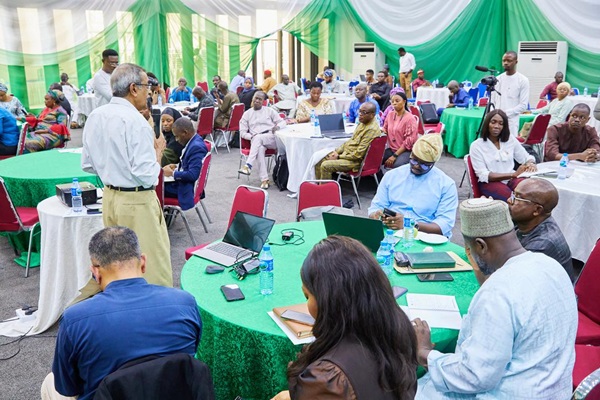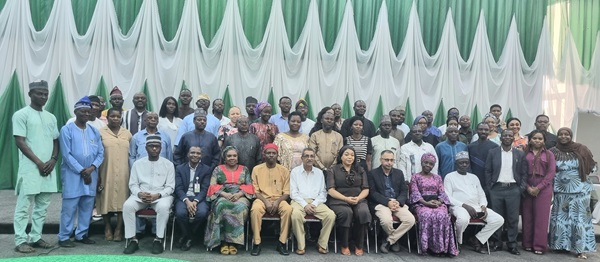
Demonstrating its continued commitment to global climate action, the Federal Government of Nigeria has officially commenced preparations for submitting its 2nd Biennial Transparency Report (BTR2) and Fourth National Communication (NC4) to the United Nations Framework Convention on Climate Change (UNFCCC).
This new reporting cycle was launched during a technical working group (TWG) workshop organised by the National Council on Climate Change Secretariat (NCCCS), in collaboration with the United Nations Development Programme (UNDP) and the Global Environment Facility (GEF). The workshop was held in Abuja and brought together key stakeholders to align national climate data, reporting frameworks and strategies.
Welcoming participants, Dr. Nkiruka Maduekwe, director-general of the NCCCS, emphasised that as a signatory to the UNFCCC and its Paris Agreement, Nigeria is obligated to submit national reports detailing its greenhouse gas (GHG) emissions by source and removal by sinks, mitigation actions, adaptation efforts, and the support received or required. These reports, she noted, must be submitted in line with reporting guidelines under the Enhanced Transparency Framework (ETF) of the Paris Agreement.
Maduekwe recalled that Nigeria has consistently met its reporting obligations, having previously submitted three national communications, two biennial update reports and, most recently, the First Biennial Transparency Report (BTR1) on December 30, 2024. She noted that Nigeria was among the first African countries to meet the UNFCCC submission deadline of December 31, 2024, a significant milestone for the country’s climate governance efforts.
“Today, we are convened once again to begin the next cycles of reporting – BTR2 and NC4 – as a combined implementation, as required under the ETF of the Paris Agreement,” she said.
Represented by Okebugwu Chukwuemeka, an assistant director in the council, Maduekwe reiterated that this process is not just a technical exercise but a critical pathway to building mutual trust, strengthening transparency and ensuring active stakeholder participation. “It establishes an institutional framework for seamless data collection, cross-sectoral engagement and, ultimately, robust climate action that reflects the realities and aspirations of Nigeria,” she added.
She also expressed confidence that the data and insights generated during the workshop would enhance the quality of the BTR2 and NC4 submissions, while also improving subsequent national climate reporting.
Speaking to journalists, UNDP’s lead consultant for the BTR2/NC4, Rasack Nayamuth explained that the biennial transparency reports serve as a mechanism for countries to update the UNFCCC on progress made in their climate mitigation strategies every two years. These reports also inform global climate support frameworks – highlighting the kind of technical, financial and capacity-building assistance needed by countries to meet their climate targets.
Nayamuth commended the Nigerian government for its proactive engagement with the process, noting that the country’s commitment to achieving net-zero emissions by 2060 is both ambitious and commendable.

Also speaking, Ann Umar of the Transparency Desk-BTR/NC, NCCC, explained that the workshop was designed to foster collaboration among stakeholders, build institutional capacity for measurement, reporting, and verification (MRV) of climate data, and align sectoral information with UNFCCC expectations. She stressed that the workshop would also assign roles to TWGs responsible for various thematic areas – GHG inventory, mitigation, adaptation, support needed and received, and other relevant information.
“This workshop will clearly outline the transparency reporting requirements, while defining and agreeing on the responsibilities of stakeholders involved in data collection, MRV and quality assurance. It also aims to address identified gaps from BTR1 to ensure improved outcomes for BTR2 and NC4,” Umar stated.
One of the participants, Philip Bankole who represented the Great League of Pioneers for Community Sustainable Development, described the workshop as a critical step in preparing stakeholders for meaningful contributions to the reporting process.
“The sessions have been enlightening. We’ve learned about how to compile the report, the critical need for collaboration and the importance of accurate data across various sectors. No single agency can do this alone,” he said.
Bankole stressed that the workshop addressed critical issues such as emissions tracking, environmental degradation, and how climate change affects agriculture, water systems, and food security. “We are seeing firsthand the impacts of deforestation, rising temperatures and declining water bodies. Climate change is no longer an abstract threat – it is happening around us, and we must act decisively.”
He said the national reports will offer a comprehensive picture of Nigeria’s environmental situation, identify challenges, and outline concrete plans for adaptation and mitigation. “The point is not just about meeting global expectations but also protecting our communities and livelihoods. That’s why everyone – from MDAs to NGOs – is here to contribute,” he said.
Bankole noted that the collaborative process will ensure that the final documents reflect diverse perspectives and on-the-ground realities. “We will all be involved in data collection and proposal development. The reports will not just be about numbers, but about actions, solutions and a shared national strategy,” he concluded.
Science Nigeria reports that the BTR2 and NC4 are key instruments for tracking Nigeria’s progress toward its nationally determined contributions (NDCs), strengthening policy coherence and accessing international support for climate-related initiatives. The current workshop is one in a series of activities scheduled to lead up to the formal submission of the reports.


